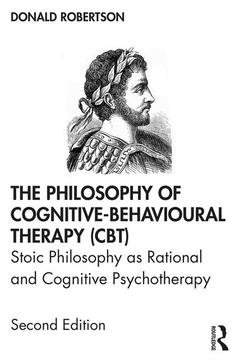The Philosophy of Cognitive-Behavioural Therapy (CBT) (2nd Ed.) Stoic Philosophy as Rational and Cognitive Psychotherapy
Auteur : Robertson Donald

This exciting new edition of The Philosophy of Cognitive-Behavioural Therapy (CBT) demonstrates how techniques and concepts from Socratic philosophy, especially Stoicism, can be integrated into the practise of CBT and other forms of psychotherapy. What can we learn about psychological therapy from ancient philosophers? Psychotherapy and philosophy were not always separate disciplines. Here, Donald Robertson explores the relationship between ancient Greek philosophy and modern cognitive-behavioural psychotherapy.
The founders of CBT described Stoicism as providing the "philosophical origins" of their approach and many parallels can be found between Stoicism and CBT, in terms of both theory and practise. Starting with hypnotism and early twentieth century rational psychotherapy and continuing through early behaviour therapy, rational-emotive behaviour therapy (REBT), and cognitive-behavioural therapy (CBT), the links between Stoic philosophy and modern psychotherapy are identified and explained. This book is the first detailed account of the influence of Stoic philosophy upon modern psychotherapy. It provides a fascinating insight into the revival of interest in ancient Western philosophy as a guide to modern living. It includes many concepts and techniques, which can be readily applied in modern psychotherapy or self-help.
This new edition, covering the growth in third-wave CBT, including mindfulness and acceptance-based therapies, will appeal to any mental health practitioner working in this area, as well as students and scholars of these fields.
Foreword to the first edition; Introduction: philosophy and psychotherapy; Part I: Philosophy and cognitive-behavioural therapy; 1. The "philosophical origins" of CBT; 2. The beginning of modern cognitive therapy; 3. A brief history of philosophical therapy; 4. Stoic philosophy and psychology; 5. Rational emotion in Stoicism and CBT; 6. Stoicism and Ellis’ rational therapy (REBT); Part II: The Stoic armamentarium; 7. Contemplation of the ideal sage; 8. Stoic mindfulness of the "here and now"; 9. Self-analysis and disputation; 10. Autosuggestion, premeditation, and retrospection; 11. Praemeditatio malorum and mental rehearsal; 12. Stoic fatalism, determinism, and acceptance; 13. The View from Above and Stoic metaphysics; 14. Stoicism and third-wave CBT; Conclusion: fate guides the willing; References; Appendix I: An example of Stoic therapeutic regime; Appendix II: The "View from Above" script; Index
Donald Robertson is a cognitive-behavioural psychotherapist, writer, and trainer. He specializes in the treatment of anxiety and in the relationship between ancient philosophy and modern psychotherapy. He is the author of six books on philosophy and psychotherapy, including The Practice of Cognitive-Behavioural Hypnotherapy: A Manual for Evidence-Based Clinical Hypnosis (2013).
Date de parution : 12-2019
15.6x23.4 cm
Date de parution : 12-2019
15.6x23.4 cm
Disponible chez l'éditeur (délai d'approvisionnement : 14 jours).
Prix indicatif 148,11 €
Ajouter au panierThème de The Philosophy of Cognitive-Behavioural Therapy (CBT) :
Mots-clés :
Young Man; third-wave CBT; Rational Psychotherapy; Stoicism; Human Suffering; Socratic philosophy; Cognitive Psychotherapy; rational-emotive behaviour therapy; Marcus Aurelius; mindfulness; Modern CBT; resilience; Phantasia Kataleptike; Stoic Week; Stoic Literature; REBT; CBT Practitioner; Reserve Clause; Stoic Sage; Diogenes; Stoic Philosophy; Universal Causal Determinism; Modern Psychotherapy; ABC Model; Rei; Ideal Sage; REBT Theory; Modern Stoicism; Stoic School; Jean Martin Charcot; Hellenistic Schools; Stoic Therapy



